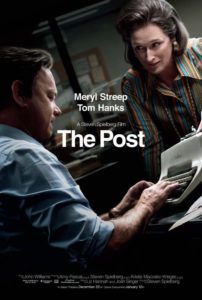The Post, 2017.
Directed by Steven Spielberg.
Starring Meryl Streep, Tom Hanks, Sarah Paulson, Bob Odenkirk, Tracy Letts, Bradley Whitford, Bruce Greenwood, Matthew Rhys, Alison Brie, Carrie Coon, Jesse Plemons, David Cross, Zach Woods, Pat Healy, John Rue, Justin Swain, Deborah Green, Phillip Casnoff, Jessie Mueller, and Michael Stuhlbarg.
SYNOPSIS:
A cover-up that spanned four U.S. Presidents pushed the country’s first female newspaper publisher and a hard-driving editor to join an unprecedented battle between journalist and government. Inspired by true events.
Prior to a New York Times exposé detailing Secretary of Defense Robert McNamara’s incompetence and mishandling of the Vietnam War, he tells owner of the Washington Post and trusting friend Katharine Graham (the classy and talented Meryl Streep gunning for her 21st Oscar nomination) that she is going to read some unflattering things about him tomorrow in the papers. Now, it’s obviously not a shocking reveal of numerous sexual assault allegations, but the short dialogue exchange is eerily similar to a number of conversations that must be going on right now in Hollywood. This isn’t the only way that Steven Spielberg’s The Post lacerates deep as relevant and timely.
Less subtle juxtapositions are also present; whatever opinions one may hold on failed presidential candidate Hillary Clinton, it’s abundantly clear that Katharine mirrors her struggles constantly fighting to prove her usefulness and worth in a powerful position uncommon at the time for women to possess. As the Nixon administration hastily decides to take legal action against the New York Times for unboxing the ugly truths behind his and previous incarnations of the government, it quickly falls into Katharine’s lap to pick up arms and keep the fight going against journalistic censorship. The problem is that she is in the middle of taking the Washington Post public to begin turning a financial profit, meaning that investors aren’t going to play ball if an incriminating article is about to be published.
Fortunately, Steven Spielberg along with writers Liz Hannah and Josh Singer (the latter wrote Best Picture winner Spotlight, and it definitely shows in tone and authentic newsroom talks) are aware not to delve too deep into the personal lives of any character, historical or fictional. Audiences are given the bare minimum of details as to how Katharine got involved in the family business (along with the stability of relationships with her loved ones). This same sentiment goes for her primary editor Ben Bradlee (Tom Hanks extending his winning streak of outstanding Spielberg performances) who is usually seen around the office or at home with his staff combing through thousands of pages of documents related to the scandal, piecing together a new breakthrough story on the evidence and more specifically, one that will put the Washington Post as a go-to source for information delivered with integrity.
As editing team and owner find common ground, the stakes of the situation increase over time, and in turn, The Post gradually grows in captivation. The many, many supporting characters (whether they be fellows journalists, disgruntled politicians, caring family members, and more played by the likes of Bob Odenkirk, Tracy Letts, Sarah Paulson, Alison Brie, Jesse Plemons, etc) are all given the proper amount of material, and never anything more or less, to accomplish their purpose. The trick that Spielberg masterfully pulls off is that even without much emotional investment into each individual person (save for Katharine and Ben), danger and urgency are palpable. Everything from strict time sensitive deadlines, threats of possible jail time, and moral discussions regarding the proper course of action crop up paving the way for scintillating drama. Naturally, everyone isn’t on the same page, adding more fuel to the fire.
However, the driving common force among all persons involved is the desire to do right by their readers, and by extension, citizens of the United States of America. This proves to be most difficult for Katharine, who must alienate herself from Robert McNamara, coming to the painful realization that an associate she put her faith and confidence into committed wrongdoings. Additionally, she is faced with the challenge of rising above listening in on business meetings and allowing others (generally men) to either make or influence her decisions. It’s an aspect that is delicately handled both within the script and the reserved, stressing showing from Meryl Streep (aside from a few overly sentimental third-act scenes that make extra use of John Williams’ immediate score), resulting in an empowering journey of fiercely grabbing her destiny, refusing to no longer operate inside the shadows of men. This is all doubly impressive considering that Meryl seemingly has slightly less screen-time than Tom Hanks despite being first-billed.
All of the above strong character work and suspenseful scenarios are also heightened by fantastic production values that feel ripped out of the 1970s. Furthermore, The Post is a striking film to look at, complete with elaborate shots of printing presses funneling through complex machinery, spitting out newspapers rapidly at the end of its cycle. The decision to utilize tracking shots throughout the offices of the Washington Post adds another layer of immersion, as a plethora of minor players are seen hard at work while the bigger fish conduct important meetings. There is an uplifting sensation of teamwork and collaboration presented that is infectious, and frankly makes cheering on the Washington Post easy.
To finally address the elephant in the room, elements of The Post are entirely comparable to the current Trump administration, but the film doesn’t beat a single belief over the audiences head other than the fact that freedom of speech and press is important no matter the outlet. People themselves can choose what they want to believe and what to discard as garbage journalism. Opinions from all backgrounds, perspectives, and walks of life deserve to be heard (especially when the topic at hand is sensitive documents detailing top-secret scandals), and no president should be allowed to place a ban or play favorites with any publication. One of the most captivating moral quandaries depicted is how journalists associate with politicians.
Considering those relevant hot-button issues among others present in the film and mentioned in this review (including more I possibly forgot about), I admit it’s easy to groan and at the idea of Steven Spielberg essentially capitalizing on the “Fake News” craze and cranking out a timely feature. That premature conclusion would come at a loss for potential viewers, though, as The Post thoughtfully expands on the modern-day political landscape while simultaneously functioning as sharply written journalistic detective work.
Flickering Myth Rating – Film: ★ ★ ★ ★ / Movie: ★ ★ ★ ★
Robert Kojder is a member of the Chicago Film Critics Association and the Flickering Myth Reviews Editor. Check here for new reviews, friend me on Facebook, follow my Twitter or Letterboxd, check out my personal non-Flickering Myth affiliated Patreon, or email me at MetalGearSolid719@gmail.com















